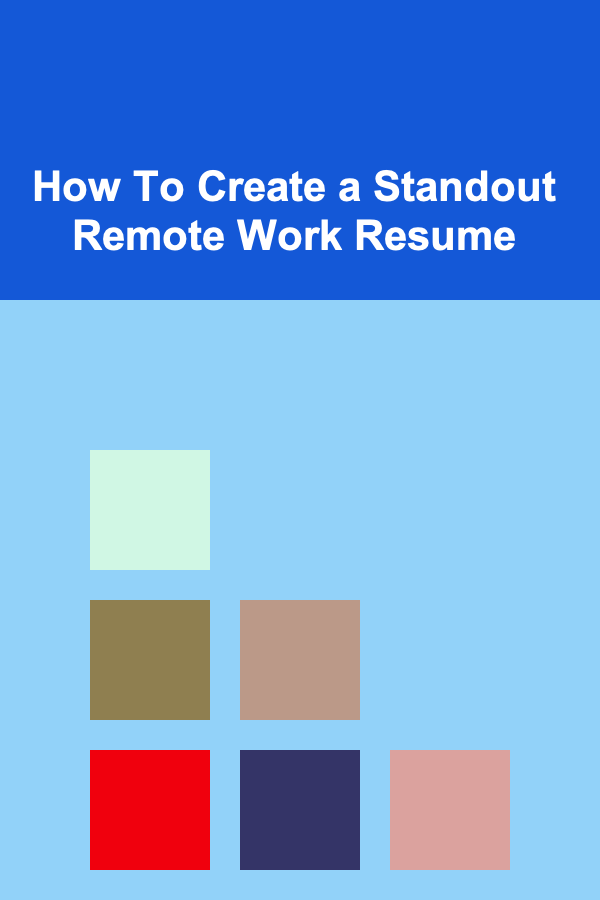
How To Create a Standout Remote Work Resume
ebook include PDF & Audio bundle (Micro Guide)
$12.99$9.99
Limited Time Offer! Order within the next:

In today's fast-evolving work environment, the demand for remote workers is on the rise. Many companies, both large and small, are transitioning to hybrid or fully remote setups, presenting an unprecedented opportunity for job seekers. However, in a sea of applicants, how do you ensure your resume stands out, especially when you're vying for remote positions? Creating a standout remote work resume requires understanding the unique qualities employers look for in remote workers, aligning your skills and experiences with those expectations, and demonstrating your ability to thrive in a remote setting.
In this article, we will explore the key elements that make up a standout remote work resume. From the structure and content to the skills and personal traits, we'll break down how to craft a resume that highlights your strengths and positions you as the ideal candidate for remote work roles.
Understanding the Remote Work Landscape
Before diving into how to craft your remote work resume, it's essential to understand the landscape of remote work. Remote jobs are not all created equal, and not all companies prioritize the same set of skills or experiences when evaluating candidates. However, certain characteristics are universally sought after in remote workers:
- Self-Motivation: Remote work requires individuals who are highly self-disciplined and can work without constant supervision.
- Strong Communication Skills: Since remote workers often communicate via email, video calls, and chat, clear and concise communication is a must.
- Time Management: Without a physical office to structure your day, remote workers need to manage their time effectively to meet deadlines and juggle multiple tasks.
- Tech-Savvy: Remote work relies heavily on technology, and employers will look for candidates who are comfortable using digital tools and platforms.
- Collaboration in Virtual Teams: Remote workers must be able to work well in distributed teams, showing that they can collaborate effectively despite the physical distance.
These attributes should inform how you present yourself on your resume. The goal is to highlight not just your qualifications and experience but also the personal traits and technical skills that make you an ideal candidate for remote work.
Tailor Your Resume for Remote Positions
To create a standout remote work resume, it's crucial to tailor it specifically for remote roles. Simply applying to a remote job with a general, one-size-fits-all resume will not cut it. Here are several strategies to tailor your resume effectively:
A. Customize Your Objective or Summary
One of the first things employers will see on your resume is the objective or summary section. This is your opportunity to introduce yourself and make a strong first impression. For remote roles, make sure to emphasize your enthusiasm for working remotely and your ability to thrive in that environment.
Example:
Objective: "Detail-oriented and self-driven marketing professional with 5+ years of experience in digital marketing and remote team collaboration. Adept at managing multiple projects, ensuring timely delivery, and exceeding client expectations. Seeking to leverage my expertise in a remote marketing coordinator position to contribute to a dynamic, growth-focused team."
A customized objective like this shows that you are not only qualified for the role but also have a genuine interest in the remote work aspect of the job.
B. Highlight Remote-Specific Skills
Employers hiring for remote positions are looking for candidates who possess certain key skills. These may differ depending on the job type, but some remote-specific skills should be emphasized across all resumes:
- Communication Tools Proficiency: Familiarity with tools like Slack, Zoom, Microsoft Teams, Google Meet, and Asana can set you apart from other candidates.
- Project Management : Many remote teams rely on project management software like Trello, Monday.com, or Jira. Highlighting your experience with these tools will demonstrate that you are comfortable managing tasks remotely.
- Time Management and Productivity: Employers value remote workers who can manage their time effectively. Include any tools you use to track your productivity, such as time-tracking apps like Toggl or Clockify.
- Self-Discipline and Motivation: While these are harder to quantify, you can describe specific instances where you've successfully managed your workload without direct supervision.
C. Showcase Remote Experience
If you have previous remote work experience, be sure to make it prominent on your resume. List remote roles in the same way you would any in-office position, but make sure to indicate that the work was done remotely. If you've worked in distributed teams or used remote collaboration tools, include those details.
Example:
Remote Project Manager | XYZ Corp | 2020--2023
- Managed a team of 10 developers spread across three continents, ensuring seamless communication through weekly video meetings and collaborative platforms.
- Utilized Asana and Slack for task management and team communication, resulting in a 30% increase in project completion rate.
- Implemented effective time management strategies, leading to a 15% increase in overall team productivity.
For those without remote work experience, you can still demonstrate your remote-readiness by emphasizing experiences where you worked independently or managed projects with a high degree of autonomy.
D. Use Action-Oriented Language
Employers look for candidates who take initiative and are results-driven. In your resume, use strong action verbs to convey your impact and achievements. For example, instead of saying "responsible for managing projects," say "led a team of 5 in the successful execution of 10+ projects, improving efficiency by 20%."
The more action-oriented your language is, the more it will communicate your proactive approach to remote work. Use measurable outcomes whenever possible to quantify your success, such as "increased team productivity by 15%" or "reduced project turnaround time by 25%."
Focus on Your Remote-Ready Soft Skills
Remote work requires specific soft skills that can't always be captured through technical experience alone. Employers want to see that you have the personality traits and interpersonal skills necessary to succeed in a remote environment.
A. Self-Motivation and Independence
Employers want to know that you can work independently without constant supervision. Provide examples of how you've managed your time and tasks in previous jobs or projects.
Example:
"Successfully completed a self-paced digital marketing certification while working full-time, applying new knowledge to increase client engagement by 25%."
This demonstrates that you can manage your workload and keep yourself accountable, even in the absence of a physical office.
B. Strong Communication Skills
As mentioned earlier, communication is a critical skill for remote work. Employers will be paying close attention to how well you communicate on your resume, both in terms of content and structure. A clear, concise resume that communicates your experience effectively will help reinforce your communication skills.
Additionally, you can highlight any specific communication methods you've used, such as email, video calls, and project management platforms. If you've worked with remote teams in the past, include examples of how you communicated and collaborated virtually.
C. Adaptability
The remote work landscape is constantly changing, and employers value workers who can adapt to new tools, technologies, and workflows. Highlight any experience you have with adapting to new work environments or learning new tools.
Example:
"Adapted quickly to new project management software (Trello) during the transition to remote work, helping my team continue to meet deadlines with no drop in performance."
D. Team Collaboration in a Remote Setting
Even though you're working remotely, you'll still need to collaborate with team members. Highlight how you've successfully worked with remote teams, overcome challenges, and contributed to collective goals. Emphasizing your ability to thrive in a team setting will show that you can collaborate effectively even when you're not in the same physical space.
Example:
"Collaborated with a cross-functional team of remote designers, developers, and marketers to launch a new product line, resulting in a 40% increase in online sales."
Formatting Tips for a Remote Work Resume
In addition to the content of your resume, the way it's formatted can also impact your chances of standing out. Remote work resumes should be easy to read, concise, and tailored to the specific job you're applying for. Here are some formatting tips to help your resume make a strong impression:
A. Keep It Clean and Simple
A cluttered or overly complex resume can turn off potential employers. Stick to a clean, simple design with clear headings, bullet points, and a professional font. Use a reverse-chronological format to showcase your most recent and relevant experiences first.
B. Use Keywords Relevant to Remote Work
Many companies use Applicant Tracking Systems (ATS) to screen resumes before they even reach a hiring manager. To increase your chances of passing the ATS scan, incorporate relevant keywords and phrases related to remote work, such as "remote collaboration," "distributed teams," "virtual communication," and "telecommuting."
C. Make It Mobile-Friendly
Many hiring managers review resumes on mobile devices, so ensure that your resume is formatted in a way that is easy to read on both desktop and mobile screens. Avoid excessive graphics, images, or text-heavy sections that might be difficult to navigate on smaller screens.
Conclusion
Creating a standout remote work resume requires more than just listing your skills and experience. It's about demonstrating your ability to work effectively in a remote environment and showcasing the qualities that make you an ideal candidate for the role. By tailoring your resume to highlight remote-specific skills, emphasizing your self-motivation and communication abilities, and formatting it for clarity and ease of reading, you can significantly increase your chances of standing out in the competitive remote job market.
Ultimately, the key to a standout remote work resume is authenticity. Show your potential employers not just what you've done, but how you've done it---whether that's working independently, managing remote projects, or collaborating with virtual teams. By doing so, you'll position yourself as a candidate who can thrive in any remote work environment.

How to Choose the Perfect Pendant Light for Your Dining Area
Read More
How to Craft a Family Movie Night with Fun Activities
Read More
How to Keep Your House Clean with Young Kids Around
Read More
How to Store Gym Clothes and Equipment Neatly
Read More
How To Grasp the Principles of Decentralized Exchanges (DEXs)
Read More
How to Build a Powerful LinkedIn Profile
Read MoreOther Products

How to Choose the Perfect Pendant Light for Your Dining Area
Read More
How to Craft a Family Movie Night with Fun Activities
Read More
How to Keep Your House Clean with Young Kids Around
Read More
How to Store Gym Clothes and Equipment Neatly
Read More
How To Grasp the Principles of Decentralized Exchanges (DEXs)
Read More